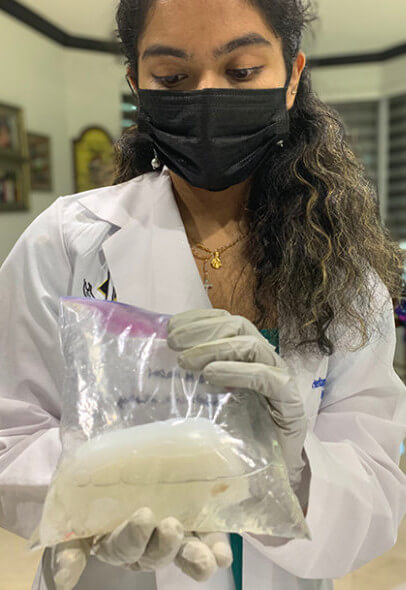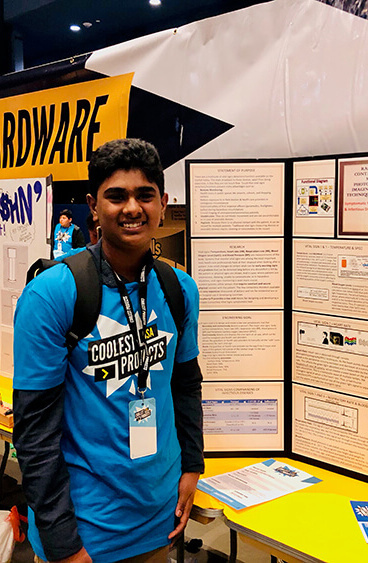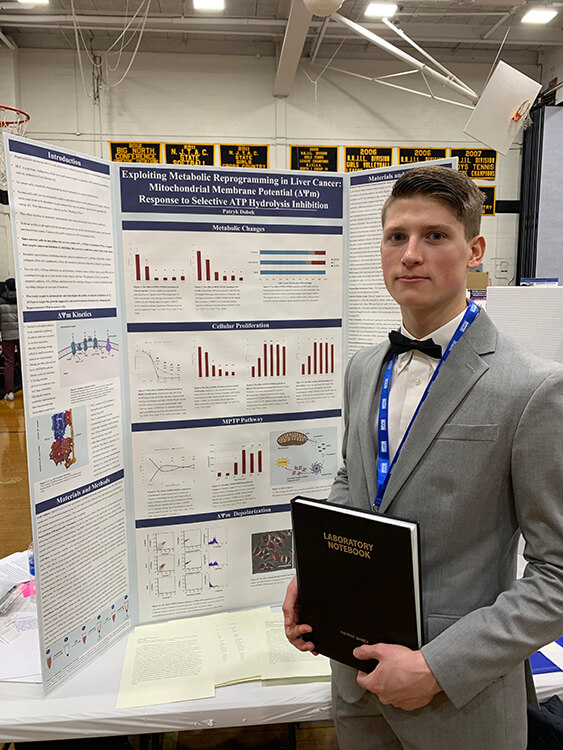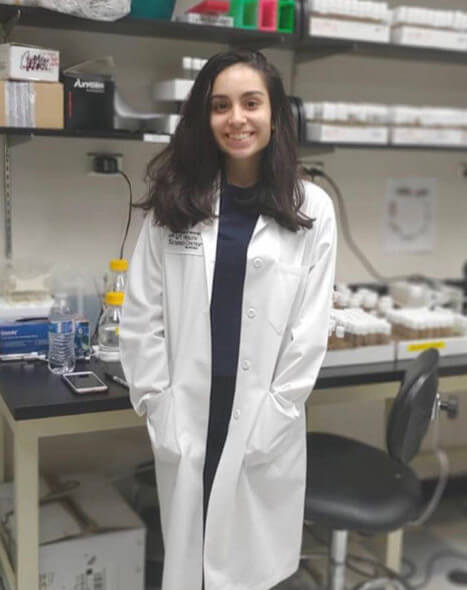The Fellows Scholarship awards $50,000, $25,000 and $10,000 scholarships to extraordinary young people, 18 and under, who have completed a significant piece of work. Application categories are Science, Technology, Engineering, Mathematics, Literature, Music, Philosophy and Outside the Box.
The class of 2021 Fellows included many who developed research specifically related to combating diseases and disorders. These Fellows’ projects are highlighted below.

Meenakshi Ambati – “Identification of Fluoxetine as a Direct NLRP3 Inhibitor to Treat Atrophic Macular Degeneration”
Dry macular degeneration is a vision-threatening disease that affects 200 million people worldwide. There is no approved treatment for this condition, and more than 100 clinical trials have failed. By combining the power of big data analysis of numerous health insurance databases, Meenakshi discovered that people taking fluoxetine, an FDA-approved anti-depressant, had a substantially reduced risk of developing dry macular degeneration. She also found that fluoxetine protected against this disease in laboratory models, suggesting that it could become the first effective drug against this blinding scourge. Repurposing an approved drug for this disease would shave billions off the cost and years off the time compared to developing a brand-new drug.
 Bala Vinaithirthan – “Prediction of Phenotypic Cancer Drug Response with an Image-Based Dual Convolutional Neural Network”
Bala Vinaithirthan – “Prediction of Phenotypic Cancer Drug Response with an Image-Based Dual Convolutional Neural Network”
Cancer is difficult to cure and develop drugs for because it varies heavily from patient to patient. Bala’s project learns from known interactions between drugs (using molecular structures) and cancer cell lines (using gene expression profiles) to predict the effectiveness of new combinations of drugs and cancer samples. With this model, currently-approved drugs and drug candidates in the pipeline can be tested for estimated effectiveness on cancer cell lines from different tissues. The model only requires a gene expression profile and drug structure, thus can be used to predict patient responses to various cancer drugs.
 Stanley Liu – “A Microfluidic Device for Blood Plasma Separation and Fluorescence Detection of Biomarkers Using Acoustic Microstreaming”
Stanley Liu – “A Microfluidic Device for Blood Plasma Separation and Fluorescence Detection of Biomarkers Using Acoustic Microstreaming”
For many developing countries, infectious diseases such as HIV are highly prevalent and lead to thousands of deaths every year. This is widely attributed to the inaccessibility of inexpensive and accurate diagnostic tests in areas with limited medical infrastructure and trained personnel. Stanley developed a handheld microfluidic diagnostic device for the detection of HIV, which could potentially provide fast and highly accurate detection of infectious diseases at less than $2 per device.
 Angelin Mathew – “Developing Off the Shelf Pancreases for Diabetic Patients: Bacterial Cellulose and Kombucha Waste Based Scaffolds with an Integrated Oxygen Generating System for Islet Cell Transplantation”
Angelin Mathew – “Developing Off the Shelf Pancreases for Diabetic Patients: Bacterial Cellulose and Kombucha Waste Based Scaffolds with an Integrated Oxygen Generating System for Islet Cell Transplantation”
Angelin’s research seeks to alleviate the burden of Type 1 Diabetes. Islet cell transplantation is a possible long-term solution for Type 1 Diabetic patients because it replaces the dysfunctioning or destroyed insulin releasing cells with healthy ones. Unfortunately, this procedure is still not widely available and has limited clinical success because the transplanted cells are usually starved of oxygen. Angelin designed a pancreas-like home for the cells by modifying the SCOBY, a Kombucha tea waste product. She also integrated a system that can deliver small amounts of oxygen to the cells in the Kombucha SCOBY home to help the insulin releasing cells to survive better.
 Adarsh Ambati – “A Contactless Vital Signs Monitor using PhotoPlethysmographic (PPG) Imaging Infrared Sensing Techniques & Computer Vision”
Adarsh Ambati – “A Contactless Vital Signs Monitor using PhotoPlethysmographic (PPG) Imaging Infrared Sensing Techniques & Computer Vision”
Adarsh developed a contactless, low-cost, prototype that detects the five vital signs — skin-temperature, heart rate, respiratory rate, blood pressure, and blood oxygen levels(Spo2). The contactless feature helps reduce potential exposure of healthcare providers (like the many that occurred during the COVID-19 outbreak), and the low-cost feature strengthens home healthcare systems— allowing for self-quarantining/isolation without overwhelming hospitals. Finally, the continuous-monitoring capability can help detect health abnormalities like Sudden Infant Death Syndrome that can be both fatal and unexpected.
 Patryk Dabek – “Exploiting Metabolic Reprogramming in Liver Cancer: Mitochondrial Membrane Potential Response to Selective ATP Hydrolysis Inhibition”
Patryk Dabek – “Exploiting Metabolic Reprogramming in Liver Cancer: Mitochondrial Membrane Potential Response to Selective ATP Hydrolysis Inhibition”
This study aims to improve patient care by overcoming the limitations of traditional treatments in dealing with the great variability of cancer as a disease. The premise of the therapy Patryk explored was to exploit a hallmark of cancer, metabolic reprogramming, as a therapeutic target. Cancer’s metabolic changes allow for its destructive growth. By showing that selectively halting a key component of cancer metabolism, Patryk’s project shows that cancer cells can be selectively targeted without harming normal cells, thus holding the promise of an effective therapy for cancer patients.
 Parisa Vaziri – “The Neuro-Protective Role of FOXO in a PINK1 Loss-of-Function Based Model of Neurodegeneration in Drosophila melanogaster”
Parisa Vaziri – “The Neuro-Protective Role of FOXO in a PINK1 Loss-of-Function Based Model of Neurodegeneration in Drosophila melanogaster”
With people living longer than they ever have before, this increased longevity has led to increased neurodegeneration. To see if the FOXO gene could prevent neurodegeneration, Parisa formed two groups of fruit flies as models, and found that one of the groups that was overexpressing FOXO had significantly healthier neurons, three times better motor function, and a 50% increased lifespan, all despite the fact that they were predisposed to neurodegeneration. Parisa concluded that FOXO protects the brain against the degenerative factor of aging, which introduces gene therapy as a possible solution to notoriously unsolvable diseases.
New for ’22, teams of 2! Two-person teams are now eligible to apply for the Fellows Scholarship! The 2022 application will open November 1, 2021, with a deadline of February 9, 2022. How to apply >
Comments